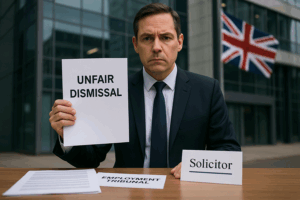Unfair dismissal: the ultimate guide

“Can they really do this to me?” That’s the question burning in your mind right now. The answer is probably no, but you have just 3 months minus one day to prove it. Your employer may have told you it’s final, that you have no recourse, that you should “move on.” They’re wrong. Unfair dismissal UK claims can result in compensation reaching £118,223 in 2025, and many cases settle for substantial unfair dismissal payouts without ever reaching tribunal. The real question isn’t whether you have unfair dismissal rights; it’s whether you’ll act fast enough to secure what you’re owed. Don’t let their corporate lawyers intimidate you into silence; get an unfair dismissal solicitor fighting for you.

Key Takeaway: What is unfair dismissal and how do I claim?
Don’t let your employer get away with illegal dismissal. Discover how to claim up to £118,223 compensation and win your case.
Unfair dismissal: Your legal rights under UK employment law
Unfair dismissal occurs when your employer terminates your employment without a legally valid reason or fails to follow proper procedures. It’s not about being fired; it’s about being fired illegally.
- Core legal framework: The Employment Rights Act 1996 (the unfair dismissal act) requires employers to prove substantive fairness (one of five grounds for unfair dismissal) and procedural fairness (reasonable process). This unfair dismissal 1996 legislation creates the two-part test that determines lawful dismissal.
- Supporting legislation: Unfair dismissal law operates alongside the Trade Union and Labour Relations Act 1992 (union dismissals), Equality Act 2010 (discrimination), Employment Tribunals Act 1996 (tribunal jurisdiction), and Public Interest Disclosure Act 1998 (whistleblowing protection).
- ACAS framework: Unfair dismissal ACAS codes provide statutory guidance carrying legal weight. The ACAS Code of Practice on Disciplinary and Grievance Procedures influences tribunal decisions on procedural fairness and compensation uplifts.
This legal framework forms the cornerstone of unfair dismissal UK employment protection, ensuring dismissals meet objective legislative standards.
What counts as unfair dismissal? Types & examples
Not all dismissals are unfair dismissal; but more are than what employers want you to believe. The difference between fair and unfair termination can mean the difference between walking away empty-handed or securing substantial compensation.
- Ordinary dismissal: Your employer must prove they had a potentially fair reason (conduct, capability, redundancy, statutory restriction, or some other substantial reason) AND acted reasonably. Even with valid unfair dismissal reasons, dismissal becomes unfair dismissal if your employer skips proper procedures, refuses alternatives, or acts unreasonably.
- Automatic dismissal: Automatically unfair dismissal requires no justification from employers; these dismissals are illegal regardless of circumstances, including pregnancy/maternity, family leave, health and safety, whistleblowing, trade union activities, or part-time discrimination. These protected categories carry unfair dismissal day one rights and often result in uncapped compensation awards.
Beyond these core categories, several other dismissal types create confusion and overlap with unfair dismissal protection:
- Unfair dismissal vs Redundancy: Genuine redundancy eliminates roles for business reasons, legitimate and potentially fair. However, unfair dismissal disguised as redundancy involves selecting you unfairly, failing to consult properly, or refusing suitable alternative employment. Many “redundancies” are actually unfair dismissal when employers target specific individuals.
- Constructive dismissal vs Wrongful dismissal: Constructive dismissal occurs when intolerable working conditions force your resignation. Your employer’s conduct must fundamentally breach your contract; serious demotion, harassment, or dangerous conditions qualify.
- Unfair dismissal vs Wrongful dismissal: Wrongful dismissal is purely contractual; inadequate notice or pay. Unfair dismissal examines whether termination was legally justified. You can claim both simultaneously.
- Discrimination dismissal: Unfair dismissal discrimination occurs when protected characteristics motivate termination. Age, race, gender, disability, or religion-based dismissals violate equality law and unfair dismissal protection simultaneously, often resulting in uncapped compensation awards.
Am I eligible to claim unfair dismissal?
The brutal truth: most employees need two years of service to claim unfair dismissal. This unfair dismissal 2 years rule applies to anyone who started work after April 2012. Your unfair dismissal years of service must be continuous employment leading up to your dismissal date.
Eligibility requirements
To claim unfair dismissal, you must satisfy these conditions:
- Dismissal occurred (actual or constructive).
- Employee status (not contractor or self-employed).
- ACAS early conciliation completed (mandatory first step).
- Claim filed within unfair dismissal time limits (3 months minus one day).
- Two years continuous service (unless automatic unfair dismissal applies).
Key exceptions
Several situations override the standard eligibility requirements:
- Constructive dismissal counts as dismissal even when you resign.
- Discrimination-related dismissals may proceed under equality law with different rules.
- Unfair dismissal probation doesn’t eliminate your rights if you’ve completed two years’ service.
- Unfair dismissal day one rights apply regardless of service length for protected dismissal reasons.
Employment status determines everything in unfair dismissal claims. Tribunals examine your actual unfair dismissal work conditions through control, integration, and mutuality of obligation tests to establish true employee status.
Time limits and deadlines: You have 3 months minus one day
You have exactly 3 months less one day from dismissal to file your unfair dismissal claim. Miss this unfair dismissal time limit and your case dies. The unfair dismissal claim time limit isn’t negotiable; tribunals rarely extend deadlines.
- Critical deadlines: Day 1-14 (contact ACAS for early conciliation), Month 1 (gather evidence, calculate losses, seek legal advice), Month 2 (complete ACAS conciliation if unsuccessful), Month 3 (submit ET1 form to tribunal).
- When time limits extend: The unfair dismissal time to claim extends only if ACAS early conciliation automatically extends the deadline, when it was “not reasonably practicable” to claim in time (extremely rare), or for continuing discrimination acts (different rules).
- Don’t wait for employers: Employers deliberately delay P45s, final pay, or grievance responses hoping you’ll miss the deadline. The unfair dismissal legal limit runs regardless of their delays. Start your claim process immediately. You can withdraw later but can’t resurrect a time-barred claim.
How to make an unfair dismissal claim and win?
Filing your unfair dismissal claim requires strategy, not luck. Employment tribunals decide cases on evidence and law; emotional appeals lose to documented facts and legal arguments. How to win an unfair dismissal claim comes down to proving your employer lacked fair reason or botched procedures:
- ACAS early conciliation: ACAS early conciliation is mandatory before filing any unfair dismissal claim. Complete the online notification form within your three-month deadline, allow ACAS to assign a conciliation officer, participate in settlement negotiations over 4-6 weeks, and obtain your certificate whether settlement is reached or not. Unfair dismissal ACAS settlements avoid tribunal uncertainty and deliver faster resolution.
- File your claim: If ACAS conciliation fails, your unfair dismissal claim follows this sequence: gather supporting evidence and documentation, calculate your losses for compensation demand, complete the ET1 form online, pay the unfair dismissal fee or apply for remission, and serve your claim on your employer within the deadline. Your unfair dismissal tribunal claim lives or dies on ET1 accuracy.
- Choose your remedy: Unfair dismissal remedies include reinstatement (getting your job back), re-engagement (similar role with same employer), or compensation (financial award). Most claimants seek compensation because reinstatement is rare. Employers typically refuse and tribunals rarely force unwilling employers to rehire dismissed employees.
- Build your winning strategy: Successful unfair dismissal claims use a two-pronged attack. Challenge the substantive reason by proving alleged misconduct didn’t occur, performance issues were unfounded, or redundancy was sham selection. Challenge the procedure by exposing inadequate investigation, denial of representation rights, failure to consider alternatives, or rushed procedures without fair hearings.
- Present bulletproof evidence: Strong unfair dismissal cases rely on email trails showing employer inconsistency, witness statements corroborating your version, company policies your employer ignored, performance records contradicting alleged failures, and medical evidence supporting capability claims. Consistent, documented accounts beat contradictory employer explanations.
- Navigate the tribunal: Unfair dismissal tribunal cases follow a timeline of employer response (weeks 1-4), case management and disclosure (months 2-6), witness statements and evidence exchange (months 6-12), and final hearing (months 12-18). Strong cases create settlement pressure; employers facing certain defeat often negotiate substantial unfair dismissal payouts to avoid public hearings and legal costs.
Unfair dismissal compensation: How much can you get?
Money talks, and unfair dismissal compensation can speak volumes. The maximum unfair dismissal compensation for 2025 has jumped to £118,223, but most awards fall far below this cap. Your actual unfair dismissal payout depends on multiple factors, not wishful thinking.
Unfair dismissal award consists of two main components:
- Basic award: Statutory payment mirroring redundancy calculations using age, service length, and weekly pay (subject to £719 cap on unfair dismissal compensation). Minimum basic award of £8,763 applies to protected dismissals.
- Compensatory award: Covers actual losses from dismissal including lost earnings, future loss, lost benefits (pension, healthcare, company car), and loss of statutory rights (£719 standard award). Maximum compensatory award is £118,223 or one year’s pay, whichever is lower.
Reality check
The average unfair dismissal payout ranges from £8,000-£15,000 for ordinary cases. Complex cases involving senior employees or discrimination can exceed £50,000. How much compensation you receive depends entirely on your specific circumstances and actual losses.
Uncapped categories: Certain dismissals carry no maximum unfair dismissal compensation limits. Whistleblowing, discrimination, and health/safety dismissals can potentially reach six-figure sums.
How to calculate your unfair dismissal compensation?
Stop guessing your unfair dismissal compensation; calculate it precisely. A compensation calculator approach reveals exactly what you’re owed and strengthens settlement negotiations. Get this wrong and you’ll either accept peanuts or demand impossible amounts.
Basic award: Your statutory minimum
Your basic award mirrors redundancy pay using this simple formula:
Age multipliers:
- Under 22: 0.5 weeks’ pay per year.
- 22-40: 1 week’s pay per year.
- 41+: 1.5 weeks’ pay per year.
Weekly pay is capped at £719 for 2025.
Sample compensation calculation table
| Component | Calculation | Amount |
| Basic Award | 6 years × 1.5 weeks × £692 | £6,228 |
| Lost Earnings | 8 months × £3,000 | £24,000 |
| Lost Pension | 8 months × £180 | £1,440 |
| Lost Benefits | 8 months × £150 (healthcare/car) | £1,200 |
| Statutory Rights | Standard award | £719 |
| Discretionary Bonus | Annual bonus ÷ 12 × months lost | £2,000 |
| TOTAL COMPENSATION | £35,587 |
Example: Marketing Manager, age 42, 6 years’ service, £3,000 monthly salary, unemployed 8 months
Compensatory award components
The compensatory award consists of five key elements that cover all financial losses resulting from your unfair dismissal:
- Lost earnings represents your weekly pay multiplied by weeks unemployed since dismissal.
- Future loss covers estimated ongoing earnings loss until you secure replacement employment.
- Lost benefits include the monetary value of pension contributions, healthcare coverage, and company car allowances you’ve lost.
- Statutory rights compensation provides a standard £719 award for losing employment protection that takes two years to rebuild.
- Discretionary bonuses can be awarded following the Horkulak v FitzGerald case, where tribunals compensate for lost discretionary bonuses if there’s reasonable expectation of payment based on past performance and established company practice.
Potential reductions
Polkey deductions apply when your employer could have dismissed you fairly with proper procedure. Tribunals reduce awards by the percentage chance that fair dismissal would have occurred anyway, for example, a 25% Polkey deduction reduces your compensation by one quarter if there was a 25% chance of lawful dismissal. Mitigation failure reduces future loss calculations when you refuse reasonable job offers or fail to actively seek replacement employment, as you must minimise your losses.
Online tools vs reality
Government compensation calculator tools provide rough estimates, but professional calculations consider dozens of variables including benefit complexities, future earning capacity, and legal precedents like Horkulak v FitzGerald for discretionary bonuses. These nuanced factors can significantly affect your final award.
ACAS code uplift: Boosting your award by 25%
Your employer’s procedural failures can add thousands to your unfair dismissal compensation. The ACAS Code of Practice isn’t just guidance; it’s a weapon that can increase your unfair dismissal payout by up to 25% when employers ignore proper procedures.
- What triggers ACAS uplift: Employment tribunals apply ACAS Code uplifts when employers unreasonably fail to follow disciplinary procedures – skipping investigation stages, refusing appeal opportunities, inadequate disciplinary meetings, failing to consider alternatives, or ignoring company policies.
- The 25% bonus: ACAS uplift ranges from 0-25% of your compensatory award. Serious procedural breaches typically attract 15-25% increases, while minor failures might add 5-10%. This uplift applies to compensatory awards, not basic awards.
- Reduction risk: The ACAS Code cuts both ways. Employees who unreasonably refuse to engage with procedures may face reduced awards. However, reductions are rarer than uplifts because employees have less control over procedural design.
Do I need a solicitor to secure unfair dismissal compensation?
Unfair dismissal solicitors don’t just fill out forms; they transform weak cases into winning strategies and strong cases into maximum payouts:
- Case evaluation: Unfair dismissal lawyers identify hidden legal arguments and overlooked compensation elements that self-represented claimants miss, often doubling potential awards through comprehensive loss analysis.
- Settlement negotiation: Professional representation maximises unfair dismissal compensation through aggressive negotiation tactics and detailed knowledge of tribunal precedents that employers respect and fear.
- Evidence strategy: Unfair dismissal lawyers know exactly which documents and witness statements destroy employer defences, presenting bulletproof cases that force higher settlement offers.
- Procedural expertise: Legal professionals avoid technical knockout defeats that kill strong cases, ensuring claims survive employer challenges and reach full compensation hearings.
- Employer intimidation: Employers treat represented claimants seriously from day one, offering substantial unfair dismissal payouts to avoid expensive legal battles against experienced unfair dismissal solicitors.
FAQs
- Can I claim if I haven’t worked 2 years? Yes, if your dismissal was automatically unfair. You have unfair dismissal day one rights for dismissals related to whistleblowing, pregnancy, trade union activities, health and safety concerns, or asserting statutory rights. The two-year rule doesn’t apply to these protected categories.
- What happens if my employer refuses to pay the tribunal award? You can enforce the award through county court bailiffs, attachment of earnings orders, or charging orders against company assets. Most employers pay rather than face enforcement action, but you may need legal help to recover stubborn debts.
- Can I claim both unfair dismissal and discrimination? Unfair dismissal and discrimination are separate legal claims that often overlap. Discrimination claims have no compensation cap and different time limits, potentially resulting in much higher awards than unfair dismissal
Unfair dismissal protection exists for good reason. Employers can’t fire you without justification or proper procedure. Your rights are valuable, but time-sensitive. Speak to a specialist for tailored advice on maximising your compensation.
Ready to sue for unfair dismissal?
If you can prove unfair dismissal, you deserve maximum compensation. When you’re ready to unfair dismissal sue, Qredible’s network of specialist employment solicitors will fight for every pound you’re owed.
KEY TAKEAWAYS
- Unfair dismissal occurs when employers terminate employment without valid reasons or proper procedures, with unfair dismissal examples including dismissals for whistleblowing, pregnancy, or inadequate disciplinary processes requiring immediate legal action within three months.
- Compensation can reach £118,223 in 2025, calculated through basic awards (based on age and service) plus compensatory awards covering actual losses, with ACAS Code breaches adding up to 25% uplifts.
- Professional legal representation significantly increases success rates and settlement amounts, as unfair dismissal solicitors possess specialised knowledge to maximise compensation and navigate complex employment tribunal procedures effectively.
Articles Sources
- marjonlaw.co.uk - https://www.marjonlaw.co.uk/employment-compensation-rates-and-limits/2025-2026
- legislation.gov.uk - https://www.legislation.gov.uk/uksi/2025/348/made
- employmentcasesupdate.co.uk - https://employmentcasesupdate.co.uk/content/employment-rights-increase-of-limits-order-2025.176d517e73554366b7aa2093f8f3cb01.htm
- simmons-simmons.com - https://www.simmons-simmons.com/en/publications/clsbrpag5008gu1a40hakigaa/employment-law-rate-changes-in-april-2025
Do you need a solicitor?
Find a solicitor on Qredible in just a few easy steps

















